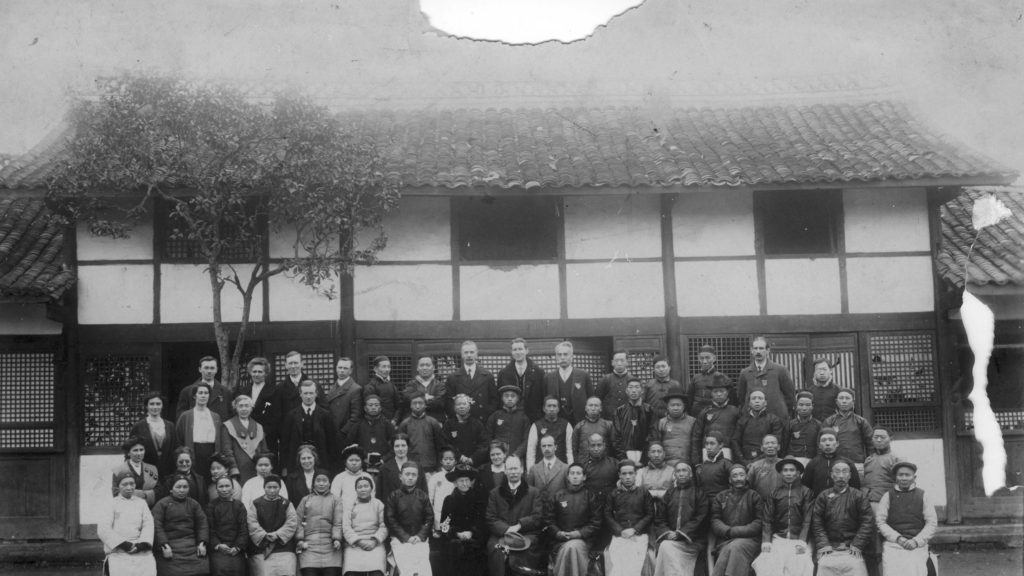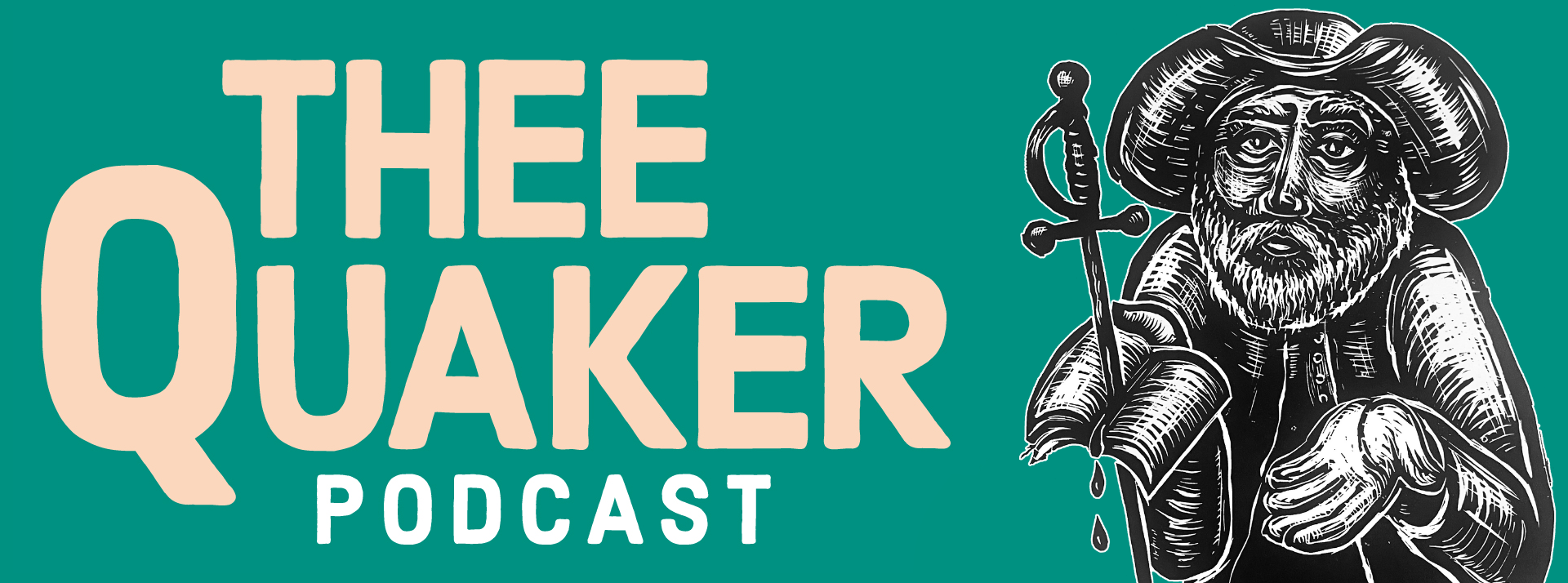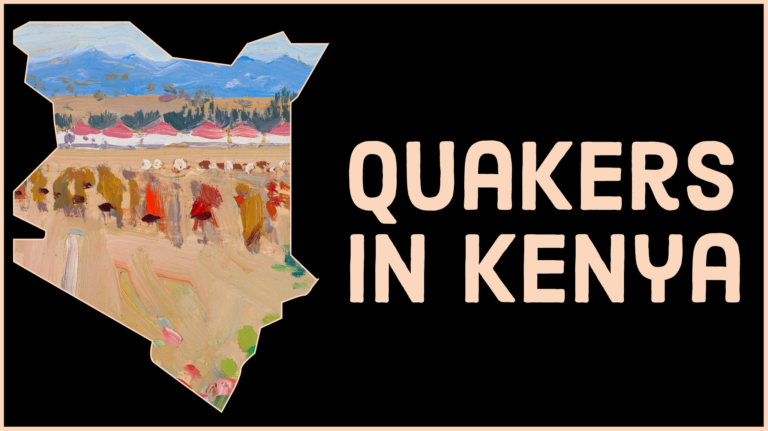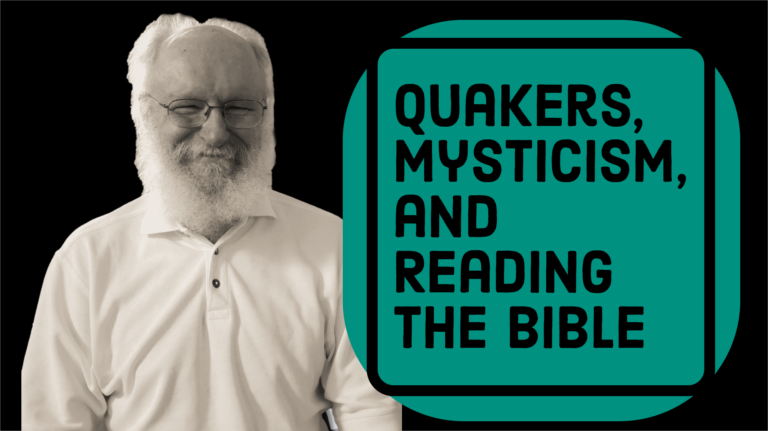Quakers in China
We don’t hear much about Quakers in China, but from the very early days of the faith, Friends felt called to go to the Far East.

On today’s episode, we explore the history of Quaker missionaries in China — both evangelical and liberal — as they lived and worked amid wars, internal conflict, and the rise of the Chinese Communist Party. And we ask, how can Friends renew their concern for this region?
Subscribe so you don’t miss an episode!
Leave a comment below to share your stories and thoughts!
Download the transcript and discussion questions.
Discussion Questions
- Reflect on this statement by Barbara Bowman: “One is in danger of sowing a mixture of two kinds of seed, the word of God and the word of Western civilization. And when harvest comes, the sower may be thrown out with the fruits of the second kind of seed.”
- What biases might you have concerning China? Compare your attitude toward China with the statements published by Friends in the 1965 Quaker publication A New China Policy: “We assume the essential unity of mankind…We assume the moral capacity of the Chinese…We assume that improvement is possible…We assume the importance of maintaining a capacity for flexibility.”
Georgia: Hello everyone. It’s Georgia here.
Jon: And Jon
Georgia: And we wanted to give you some great news.
Jon: Yeah! If you’ve been listening, you know that we had a goal of reaching 100 podcast supporters by the end of June. And we met that goal.
Georgia: We sure did! We have now reached, actually exceeded, 100 podcast supporters, and we’re so thankful to all of you who listened and decided to give your hard-earned money to help us grow this show.
Jon: We are so grateful for your generosity and we’re really floored by the response. This is a big milestone for us, and it shows us how much you all value and believe in this project. We put in a lot of hours to develop every episode and we’re so lucky to have such thoughtful and supportive listeners.
Georgia: Yes, so again, thank you thank you thank you. And now here’s today’s episode.
Patrick Lozada: There are Quakers who are engaged on Latin America issues on Israel, Palestine, Iran, there is almost no work being done on Asia, despite many saying that it’s the preeminent military threat and the preliminary threat to peace in our lifetime. So the Department of Defense and folks in government are focused on one threat and peacemakers are focused on other things. We have to ask ourselves if we’re focusing on the right place. And Quakers are entirely missing in action.
Various: Thee Quaker Podcast. Story, spirit, sound.
Georgia: I’m Georgia Sparling. Glad to be back after a few weeks away where Jon and I met tons of listeners in Ohio and Indiana. We also interviewed a lot of Friends who you’ll be hearing throughout the rest of this season and into next season. So get ready for lots of great midwestern Quaker content! But today we’re talking about Quakers in China.
And this one will be different from the other stories that we’ve been doing like Quakers in Australia and Quakers in Kenya and that’s because unlike those places, there isn’t really a modern-day Quaker presence, at least not in Mainland China and if there is, they are sort of underground because China remains pretty restrictive about non-government sanctioned religious activity.
But Quakers do have a history in China and it’s really interesting to consider especially when we compare it to our recent Quakers in Kenya episode. Like Kenya, Quakers had access to China because of Western colonialism, they established schools and medical outposts, but then China’s history, of course, takes a very different turn.
In today’s episode we’re going to learn about the little-known history of Quakerism in China, we’re going to talk colonialism, and we’re going to consider what responsibility Friends have today when it comes to this world superpower.
Georgia
I spoke with a few people who have intimate knowledge of Quakers in China, and first I want to introduce you to Patrick Lozada, a member of Friends Meeting in Washington D.C.
Patrick Lozada: I’ve been engaged with China for most of my life. I went to China first in 1997, accompanying my dad as he did doctoral research in anthropology in northern Guangdong province, and just kept engaging with the country throughout my academic studies and then eventually in my career. I went to Haverford College where I studied history, specifically Chinese history. I worked in their Quaker collection over the summers looking at China and East Asia focused issues from a Quaker perspective and then spent seven years in China in my 20s focused mostly on US-China economic relations and issues in that space.
Georgia: For the past several years, Patrick has taught a workshop for Friends called “200 Years of Quaker Engagement with China.”
Patrick: I found that Quakers can speak very eloquently about the Middle East or Latin America, but very few have personal experience with East Asia and China specifically.
Georgia: And yet, Quakers had an interest in China from the very early years of the faith.
Patrick: If you go back to the journal of George Fox in 1661, he writes about how Friends were moved to go beyond the seas to publish truth in foreign countries. John Stubbs, Henry Fell, and Richard Kostropvr were moved to go towards China and Prester John’s country, that’s modern day Ethiopia, but no masters of ship would carry them. So I like to imagine almost this like alternative history of Quakers, you know, instead of going to America or elsewhere, going instead towards China in the 1660s.
Obviously that wasn’t the history that we ended up with and there’s a number of reasons for that, but it wasn’t much after that, that there were other instances of Chinese, of Quaker engagement with China. That sort of started, I would say maybe 150 years later in the 19th century with Quakers as prominent merchants who traded with China before and up to commercial opening with China in the beginning of European imperialism.
Georgia: One of the first Quaker-Chinese interactions comes around the time of a major event in Chinese-European relations.
Patrick: I think one really interesting vignette in Quaker engagement with China comes when Quakers were mostly engaging with China as merchants. And it comes in the run up to an event in Chinese history called the First Opium War, which starts in 1839.
Europeans had been very active in selling opium to China in part to counteract a significant trade deficit because there were so many products and services coming into Europe from China, whether it was tea, porcelain. Remember at this time, China was incredibly advanced and had products that people in the tWest had never seen. European countries began selling opium into China, which had really predictable impacts on people in the country. It was, it became a public health scourge. And so, the emperor during the Qing Empire ended up appointing someone, a gentleman by the name of Lin Zexu to stomp out the opium trade and to stop all exports of opium into China. This eventually created an incredibly hostile atmosphere between primarily the United Kin vgdom and China. The British dispatched a fleet of 16 warships with 4,000 troops and 16,000 gallons of rum to China, and they set up a blockade outside of the port of Canton. And so there was a Quaker-owned ship called the Indianman Thomas Coots and a captain named Captain Warner. In this instance, he brought products to China, but he also became a kind of Quaker bridge between China and the United Kingdom at that point, bringing back correspondence that had been blocked and not accepted by British representatives.
Georgia: Lin Zexu, the man tasked with stopping the opium trade, writes a letter to Queen Victoria and sends it through Captain Warner. In the letter he says that England has “seduced our Chinese people, and caused every province of the land to overflow with that poison.” And pointedly says – we know you won’t allow this in your own country, yet you’ve plagued ours with it for your own gain.
Unfortunately, the British empire would not be persuaded.
Patrick: I wish I could say it had a happy ending and this really moved the needle, but this incidentally ended up triggering events that started the Opium War.
Georgia: Which triggers the start of Europe’s colonization of China.
So, fun fact, I lived in China for six years, and although I’m no history buff, I know a little about this topic, particularly as it concerns Shanghai, which is a relatively young city that was largely built up by foreigners. These foreigners established concessions or districts where they lived and shopped, etc., and where Chinese often weren’t allowed, in their own country. In fact, Shanghai’s most notable historic buildings are strikingly Western, and even in their beauty, they speak to the decadence, vice, and oppression that these lao wei, or foreign devils, brought with them.
This colonization also brought with it religion.
Patrick: Yeah, missionaries really began to enter China on the heels of European colonialism, which I think was something that we have to wrestle with as Friends. And it was actually something, interestingly, that people in the moment wrestled with. And you see this in Friends writing, Quaker missionaries who were in China. Obviously they didn’t feel like they were associated with violent colonialism because they wouldn’t take up arms. And yet nonetheless, what enabled their engagement with China and their missionary work, fundamentally, was the fact that there were British warships or French warships that were supporting their ability to do so. So we really see these missionaries come after the Second Opium War, which ends in 1858, which allowed and sanctioned missionary activity in the country.
Georgia: China saw two different branches of Quaker missionaries who established themselves in several regions of the country. I called up Andrew Taylor — an associate professor of religious studies at the College of Saint Scholastica in Duluth, Minnesota. Andrew has researched Quaker documents that still survive in Chinese and there aren’t a lot of them.
Andrew Taylor: I’ve always had an interest in Quakerism in part because I went to Guilford College as an undergraduate. And so I decided to look into some Chinese archives and see if there were any records of Quakers. And that led me to this current project.
Georgia: Andrew has been able to access records that show two different groups of Quakers missionaries settled in two different parts of China — one near Nanjing in Eastern China, the other more than 1,000 miles away in Sichuan Province, located in southwestern China.
Andrew: So the group in Luhe just north of Nanjing was run by American Friends Missions in Asia, which was an outreach program of the Ohio Yearly Meeting that later became incorporated with Evangelical Friends Church International, the EFCI. And so they definitely had a more evangelical bent. And that’s reflected in sort of the records from their revival that I was able to find. It’s almost entirely prayer and worship and Bible reading.
There are no Quaker distinctives really at all. There’s nothing about George Fox or the inward light as reflects, you know, the broader shift that’s happening in America at this time as well. For Chinese converts to Quakerism, I’m not sure that they perceived it as being dramatically different than any other form of Christianity, as far as I can tell.
The mission in Chengdu was initially founded by the Friends Foreign Mission Association. So they were founded by British friends for the most part. And the British friends are sort of on their own trajectory. So they don’t quite have the same evangelical liberal-split that you have going on in America. But broadly, they were a little bit more traditionally Christian in orientation.
Georgia: While the Luhe mission was strictly evangelical, the Quakers in Sichuan province were more varied in their work and focus, with Americans who were more evangelical joining the British Friends. Largely, though, these Friends focused their work on the learned class.
Andrew: They were trying to position Quakerism as being consistent with traditional Chinese religion, but also with sort of like scientific discoveries that were coming out of America and Europe that were seen as being sort of cutting edge by Chinese intellectuals at the time. So where the Luhe missionaries looked a lot more like traditional evangelical missionaries, the ones in Chengdu were trying to situate Quakerism as part of this broader narrative about scientific and moral progress, which I thought was really interesting.
Georgia: The two groups had very different approaches, down to the words they used to describe Quakerism. This really floored me.
Andrew: In Luhe, they had to think about how to translate the word Quaker into Chinese, and they chose to do it phonetically. So they said they identified themselves as Guigev, which is not a term that has any traditional meaning inside of Chinese. Whereas in Chengdu, the friends there opted to go for a semantic translation. And so they called themselves the Gongyi Hui, which means something like the common friendship society, but it doesn’t obviously mark them as a religious group in a meaningful way.
And so one thing I thought was interesting was that someone could conceivably be a member of the Luhe meeting traveled to Chengdu and see another Quaker meeting and actually not even know that those were founded by the same religious group. They might think of them as being completely distinct.
Georgia: Again, I’m just rendered slack jawed by this fact and how it embodies what I’ve seen among different branches of Friends, who sometimes have wildly different ideas of what Quakerism is and how to practice it. These Friends just put a very fine point on it by using completely different names among people who had no other context for the religion. It’s something to chew on. Anyway, the missionaries in both Luhe and Sichuan Province did see Chinese people come to Quakerism. Here is Patrick Lozada:
Patrick: You know, we see pictures of yearly meetings going back to 1916 that were widely attended by representative of the five different Quaker meetings at that point in Sichuan Province.
Georgia: Some people who eventually became prominent back home got their start as missionaries in China. For example, Henry Hodgkin, the founder of Pendle Hill, the Quaker center in Pennsylvania and co-founder of the International Fellowship for Reconciliation, spent about five years in Chengdu, Sichuan and was a founder of West China Union University.
But the Sichuan Quakers weren’t exactly a unified group. According to a few of the people I spoke with, the foreign Quakers in Sichuan had different ideas about their purpose in China. One woman, Barbara Bowman, had missionary stamped on her passport, but only because of the conventions of the day. She saw herself first as a teacher.
And then there were those who didn’t feel the Sichuan mission was evangelical enough.
Andrew: There was a British missionary who thought the entire thing was insufficiently Christian. And so she went and started her own sort of like school/meeting in the countryside and then got in trouble with the local government. And I’m not entirely sure what happened to her. But even among the foreign missionaries, there seems to have been a lot of in-fighting over how to present Quakerism.
Georgia: Despite their different approaches, source material suggests that the Luhe Quakers and the Sichuan Quakers looked similar in some ways.
Andrew: For example, both groups were doing medical work, even though for the evangelical friends they were framing that, I think, more as care and for the more liberal missionaries, they were framing that as like bringing science and technology into China, like into a society that they felt needed it.
Georgia: Yet the Sichuan missionaries stand out in particular for their egalitarian efforts. Patrick Lozada explains.
Patrick: Quakers were very focused on empowering local Chinese in the context of their work. They wanted to turn the missionary work, the work running the meeting and the organization of the meeting itself over to the Chinese and they were focused on doing a lot of good works. They established several hospitals, Suining Hospital, Wenfengda Middle School, Guangyi Friends High School.
These were all institutions that they established to do education and hospital work in China. And while they were doing that, they were in China. China was at this time had a number of wars.
Georgia: Because of these wars and the subsequent communist rule, there are very few surviving documents that demonstrate the experience of Chinese Quakers, but it seems they did hold leadership in their meetings. Here’s Andrew:
Andrew: I found a really interesting account of a revival from the 1920s that one of the Friends meetings there put on, and that was run and led pretty much entirely by Chinese Quakers themselves, not by the missionaries. From Chengdu, I was able to find some publications, including a magazine that local Chinese Quakers put out, sort of trying to attract converts, trying to explain what Quaker was to the broader Chinese populace. And it’s a really interesting publication in part because it wasn’t run by the missionaries. It seems to have been run by Quakers from Chengdu.
Georgia: Most of the information we do have, though, is from the foreign missionaries. Polly Ashmore wrote her undergraduate dissertation on eight British Quaker missionaries who lived in Sichuan province from about 1949-1952 and whose correspondence survives in two London archives.
Polly Ashmore: I was looking at their letters, their birthday cards, everything that they sent home to try and understand what their experience of living in the early communist people’s republic of China was like and it was just, yeah, to understand how were they treated as Christians, how are they treated as foreigners, and then their own experience of a complete societal change and what it was like being in the middle of a revolution.
Georgia: Of the missionaries Polly researched, half lived in Chengdu proper. The others lived in villages around Sichuan Province and they all seem to have a different focus.
Polly: So there was a couple who were in one village nearby called Tung Liang who called Leonard and Laura Walker. They ran quite a small mission I think and they went around in a movie van and they showed movies on the back of their van and they were quite different to the others it seemed, although they didn’t write as many letters home because they seemed to be a lot more into evangelical work. And then there was a lady called Rose Tebbot who had lived alone in China for 20 years, or not alone, of course, she was with her Chinese friends, but she hadn’t come to and fro back to the UK. So she was really based in China. She was in a little village called Santai. And then those who were in Chengdu, there was Bill Sewell who was probably the most famous of the group. He wrote quite a lot afterwards about his experiences, him and his wife Hilda. And he was a chemistry teacher, she was the field treasurer for the Quaker mission in Chengdu. And then there was Barbara Bowman, who amazingly was still alive when I did the project.
Georgia: So there had been decades of Quaker presence in China when the communists came into power, and it seems that Friends in Sichuan were both cautiously optimistic and wary of how it would affect their standing in the country.
Polly: They all had quite different experiences of the revolution and it was amazing reading their letters home about the actual day that the communist troops came into their towns and cities. So it seems like on the eve that they came in, which is Christmas Day in 1949 for Chengdu, people were quite frightened. So I think it was Rose said that she packed her things into a bag and she stuffed it up the chimney and she just sat and waited and that the streets were silent.
I think this was Barbara said this about Chengdu, which is a big city. So to imagine the streets silent is quite eerie. And she said everyone was just waiting and waiting that day and the women had barricaded themselves into the university.
But then there seems to be this big turnaround where a few of them kind of really get into it and go out into the streets and celebrate with people. How much of that celebration is real versus you know, realizing that the Communist Party is now here to stay, so you better get out and show your face fast, is not entirely clear. But I think for some of the missionaries, for Bill certainly, it seems that he was very excited by the idea of this, of building a new society and a lot of the kind of the egalitarian principles that came with it.
Georgia: But some were accused of stealing, some saw their Chinese friends turn their back on them.
Polly: Particularly in the early republic, there were these things called self-criticism meetings and it would essentially be, by the sounds of it, somebody would stand up and say, you know, I’ve realized that I was acting in an imperialist way in the past and so on and I think they turned into quite dark arenas for hounding people and accusing and things like that but it seems from these missionaries descriptions of the early days that they were actually fascinating for them and very powerful because people were talking about how they could enact the social mission that Quakers had always been talking about. And for some of those missionaries, they felt that it proved to them that they had failed as Christians and that’s how they described it. They said that, you know, this is showing how short we came in acting out our Christian ideals.
We lived in better houses than local people, you know. So in the early days, at least, they seemed to have a feeling that this was a huge chance for self growth, a chance for growing closer to local people, to Chinese colleagues who there had.
often been a bit of a separation with before because they’re, you know, they’re seen as outsiders. And some of them had already consciously rejected that. So Barbara, for example, asked to live with her Chinese colleagues instead of living in a separate kind of missionary mansion. And the Quakers generally lived quite simply.
Georgia: But this grace period wasn’t to last.
Polly: Barbara said, “one is in danger of sowing a mixture of two kinds of seed, the word of God and the word of Western civilization. And when harvest comes, the sower may be thrown out with the fruits of the second kind of seed.” And she was so right.
Georgia: After the break, we’ll look at the rise of the Chinese Communist Party and the implications for the Quaker mission and ask why 21st century Friends have steered clear of China.
Friends World Committee For Consultation: You might remember last year’s podcast episode about Quakerism’s co-founder George Fox. Well, this year marks 400 years since his birth.
And Friends World Committee for Consultation is inviting you to celebrate that — after nearly four centuries — Quakers are still here, still growing and still making change.
There are going to be birthday parties, speaker events and contemplative meetings, in the UK, Australia, India, the US and beyond. Additionally, there is a series of online courses, accessible from anywhere.
The celebration is also a chance to explore the foundations that connect nearly 400,000 Friends today, and to share the story of our origins across borders, across generations and with newcomers.
To find out more, visit the Friends World Committee for Consultation’s website: fwcc.world/fox where you can find a listing of events, as well as a video of ‘the George Fox song’ performed by Thee Quaker Podcast’s own Jon Watts. That’s fwcc.world/fox.
Georgia: Welcome back. As communism took root, the missionaries were urged to come home. They resisted, but the increasing danger of the situation coupled with concerns back home convinced or necessitated that they return to their home countries.
Polly: Leonard and Laura Walker said in a letter that people became nervous about being friendly in public with them and they then decided it was time to go. So I think they might have been more in a situation where they were pushed. And Rose Hebbett, who I mentioned earlier, she was thrown out after somebody came out with an inspiring witness to God and that was how she described it. And it was a newly converted Chinese friend and she said it had aroused suspicions and so she left. I’m not sure if she was asked to leave or she just decided to.
Georgia: By 1952, the British Quakers had repatriated, bringing with them a fresh perspective on what it meant to be part of the Religious Society of Friends.
Polly spoke with Barbara, who was a young teacher when she arrived in Sichuan. Some six decades later Polly called Barbara, then 88, to hear about her experiences in China.
Polly: It seemed that it was kind of the making of her. Maybe I’m going too far with that, but it seemed that the experience taught her a lot. She didn’t talk about it with kind of rose tinted spectacles, but she spoke about it as an important time in her life where she had seen a society in flux and seen a huge change and certainly her writing about it immediately after, talked about the lessons that she learned that stayed with her for life, kind of letting go of the trappings of privilege. When the revolution came, when the criticism meeting started, I think it really forced her to confront all the ways in which being part of a world in which empire was a real force did benefit her and all the ways that her life was different to her Chinese colleagues.
Georgia: Barbara said: “Christianity is the answer to the world’s problems, but our presentation of it…[was] pitifully inadequate.”
Polly: All of them who had lived in Chengdu challenged other Friends to say, are you really living the Quaker way? Because they themselves have been challenged so aggressively in a way that I imagine you just wouldn’t come across in, you know, polite meetings in the UK. Really, really being challenged like that seemed to affect them in a good way and make them feel that they had to be more honest with, or they had to align the way they lived more closely with their Quaker ideals.
Georgia: I asked Patrick Lozada to talk more about the spiritual leadings of the Quaker missionaries in Sichuan.
Patrick Lozada: It’s a little bit hard to like look in the soul of the Quaker missionaries working in China. That said, I think Quakers were very attuned to two elements. One of which was the peace testimony, right? That set them apart from a lot of other different folks, particularly in this incredibly violent and dangerous part of the world during the warlord period, during the takeover of the Nationalist Party, during the reinstatement briefly of the empire under Yun Shikai, and then through the conflict with the communists and the nationalists, they were committed to peace. And that really set them apart from other folks.
The other thing I would say is a commitment to equality. And, you know, Quakers, you know, while equality is richly in the Bible and the Christian tradition, I would say Quakers took it to another level, really by pushing the control over the Friends institutions to the Chinese in a number of instances, whether it was with the control of the high school, the control of the Quaker organizations in China.
Georgia: Along those lines, I would be remiss not to mention the Friends Ambulance Unit, which was one of the most visible ministries of Friends in China and deserves an entire episode on it’s own one day. The Ambulance Unit, which also operated in Europe, treated Chinese during multiple violent conflicts during World War II, threats from the Soviet Union, and also the battle between nationalists and communists — serving both sides. Here, the equality testimony really comes to the forefront and is probably the reason they were allowed to stay in the China even as other religious groups got kicked out. But Patrick says,
Patrick: their presence as foreigners there was only somewhat tolerated by the communist authorities.
Georgia: The Sichuan missionaries did try to maintain an anti-colonial approach, says Andrew.
Andrew: Part of what I found so interesting about the liberal friends is I think they were also really aware of how horrible colonialism was and were trying to position themselves as anti-colonialist. And looking back at them, I think most of us would say they probably failed, that they ultimately were pretty complicit in the American, the Euro-American Colonialist Project and displacing traditional Chinese categories of thought and religious practice with American European ones. And so for me, it’s just a call toward humility, right? And recognize that this work of decolonizing, whether that’s decolonizing an academic discipline or decolonizing a Quaker meeting is something that’s critically important. And it’s all something that we should be actively striving to do and thinking about, but also recognizing that a lot of our forebears have also tried to do this and we’re not successful despite their best efforts and despite a lot of goodwill and intelligence and thoughtfulness. And so, you know, striving to do the right thing and recognizing that we’ll probably fail despite our best efforts.
Georgia: And what happened to Chinese Quakers? Unlike Quakers in Kenya, who continued to grow even after circumstances forced out foreign missionaries, Quakerism didn’t maintain a foothold in China. Andrew estimates there were probably never more than a few thousand Chinese Quakers on the mainland before the Chinese Communist Party pressured foreigners to leave. Some of them likely joined other Christian denominations. Many of the Luhe Quakers fled to Taiwan or Hong Kong where there remains a Quaker presence today.
But try to find evidence of Friends on the mainland and there is next to nothing, says Andrew.
Andrew: I asked a few Chinese friends who lived by some of the former Quaker centers that they had ever heard of the Quakers, and they all said no. My impression is that folks are familiar with the Quakers in roughly the same way most Americans are. They know Quakers mostly through Quaker Oats. And then for some academics and elites, they might know them for education or for pacifism. But there’s no widespread memory of them as a religious group inside of China.
Georgia: Just as Chinese in the East don’t remember Quakers, Friends in the West have little memory of Quaker involvement in the Asia, though there was a contingent of former missionaries and Friends Ambulance Unit workers who, in the mid-60s, came together to pen a document about relations between the West and China.
Patrick: And these were people in 1965, long before opening with China, who were thinking in really prophetic terms about what the relationship between the most populous country in the world, right, and the United States should look like. What I like about it is that they coalesced around principles. They called it in chapter two, “a fresh look at basic assumptions that were tied to the Quaker faith,” but also remain relevant to, I would say, Quaker engagement with any group of people. And they are as follows. We assume the essential unity of mankind.
We assume the moral capacity of the Chinese. That’s really tying back to our belief that there’s that of God in everyone. We assume that improvement is possible. You know, at this time, right, this is right during a tremendous period of upheaval in China, there are millions dying, the idea that things could get better didn’t feel very realistic at that time period. And yet 10 years later, 20 years later, there’s an enormous transformation that you couldn’t have anticipated at that time if you’re just drawing a straight line. And the last one is we assume the importance of maintaining a capacity for flexibility. Instead of being in one mindset, we have to be open to the idea that the world will change. And the world did change. And so I think Quakers thinking about this today should look back on these assumptions from this pamphlet and think about baking it into the work they do now.
Georgia: Patrick says that part of the reason why he started his workshop on Quakers and China was because there is almost no engagement today between that country and Friends — not on individual levels and not among Quaker nonprofits.
Patrick: There are Quakers who are engaged on Latin America issues on Israel, Palestine, Iran, there is almost no work being done on Asia, despite many saying that it’s the preeminent military threat and the preliminary threat to peace in our lifetime. So if the Department of Defense and folks in government are focused on one threat and peacemakers are focused on other things. We have to ask ourselves if we’re focusing on the right place. And Quakers are entirely missing in action on this. So we have to take it upon ourselves. In a lot of ways think about and chart a course for Quakers as peacemakers. How do we want to engage with this really the most consequential relationship of our time?
Georgia: Patrick acknowledges that it is a huge and intimidating task.
Patrick: It is the fact that China forces Friends to think in different ways.
I think Quakers were very used to engaging with a post -Cold War world where the United States was the preeminent economic power and we had to think in sort of multilateral terms where there was no significant competitor and the world largely aligned with institutions that we were comfortable working with. Things are increasingly disintegrated in the world. And China does wish to confront the United States in a number of ways in the context of the international landscape. So how do we reckon with that? It forces us to do some hard thinking on what our assumptions are and how the world works. And it also forces us to think about really messy issues of international trade and economics that Quakers fundamentally aren’t comfortable with. Even though if we look back in our history, right, Quakers were very engaged with global trade. They’re ambivalent towards it now.
Georgia: And as both Patrick and I can attest. There’s a lot to love about China.
Patrick: Yeah, I mean, China is a wonderful place. The people there are incredibly dynamic and open. It’s a place where a lot of things are possible.
Georgia: Thank you for listening. Thank you to our guests! Patrick Lozado teaches “200 Years of Quaker Engagement with China.” Visit his website, patricklozado.com to find out more about him and his work. Andrew Taylor has a forthcoming chapter on the liberal Quaker mission in China which will be in Global Quakerism in a Postcolonial Context: 1938 – 2018, due out in 2025. And Polly Ashmore does not work in anything China related right now, but a big thank you to her for digging out her notes and research from her undergraduate years.
As always, you can find more information about our episode as well as discussion questions and a transcript of today’s episode on our website, QuakerPodcast.com.
This episode was reported, written, and produced by me, Georgia Sparling. Jon Watts cohosted and wrote and performed the music for this episode.
Studio D mixed the episode and your moment of Quaker Zen was read by Grace Gonglewski.
Thee Quaker Podcast is a part of Thee Quaker Project, a Quaker media organization whose focus is on lifting up voices of spiritual courage and giving Quakers a platform in 21st century media.
If you want to support our work, please consider becoming a monthly supporter. Every contribution expands our capacity to tell Quaker stories in a fresh way and makes this project more sustainable!
Visit QuakerPodcast.com for more information.
And now for Your Moment of Quaker Zen.
Grace Gonglewski: Parker J. Palmer, 1991: The core message of all the great spiritual traditions is ‘Be not afraid.’ Rather, be confident that life is good and trustworthy. In this light, the great failure is not that of leading a full and vital active life, with all the mistakes and suffering such a life will bring (along with its joys). Instead, the failure is to withdraw fearfully from the place to which one is called, to squander the most precious of all our birthrights — the experience of aliveness itself.
Georgia: Sign up for daily or weekly Quaker wisdom to accompany you on your spiritual path, just go to DailyQuaker.com. That’s DailyQuaker.com.
Recorded, written, and edited by Georgia Sparling.
Original music and sound design by Jon Watts (Listen to more of Jon’s music here.)
Mixed and mastered by Studio D.
Supported by the Friends World Committee for Consultation’s celebration of George Fox’s 400th birthday. For more information, fwcc.world/fox.
And we’re supported by listeners like you!
Referenced in this episode:
- Andrew Taylor’s article on missions in China will be in the forthcoming Global Quakerism in a Postcolonial Context: 1938 – 2018, due out in 2025.
- Learn more about Patrick Lozada.








Thanks for this unexpected and wonderful episode on Quakers and China. Some have commented on Quakerism’s similarities with Taoism for good reason. However, the Chinese philosophy that seems to have the most in common with that of George Fox is that of Mozi. The basis of Mozi’s philosophy is universal love which would help bring happiness and world peace. During his life around 500 BC and for a few centuries after, he rivaled Confucius in influence in China.
Similar to Fox, the philosophy of Mozi had both spiritual and practical dimensions. Unlike many Chinese philosophers, Mozi appeared to have believed in a personal God that created and loves all beings. Mozi practiced simplicity in his own life and encouraged others to do the same. He opposed elaborate architecture and disapproved of expensive ceremonial funerals as a waste of resources.
According to Mozi, “What is the will of heaven that is to be obeyed? It is to love all the people in the world without distinction.” Mozi pursued a social application of this belief. China of 500 BC was rocked by major conflict between provinces. Mozi and his students traveled throughout the country, meeting with various provincial leaders in order to both stop and prevent wars.
Quakerism has much to offer today’s world as long as respect is given to the homegrown cultures of others. In the case of China, Mozi’s philosophy is an indigenous common ground that could help facilitate mutually respectful dialogue between Quakers and the Chinese.